De Amerikaanse dichter Gregory Corso werd geboren in New York op 26 maart 1930. Zie ook alle tags voor Gregory Corso op dit blog.
1959
Uncomprising year—I see no meaning to life.
Though this abled self is here nonetheless,
either in trade gold or grammaticness,
I drop the wheelwright’s simple principle—
Why weave the garland? Why ring the bell?
Penurious butchery these notoriously human years,
these confident births these lucid deaths these years.
Dream’s flesh blood reals down life’s mystery—
there is no mystery.
Cold history knows no dynastic Atlantis.
The habitual myth has an eagerness to quit.
No meaning to life can be found in this holy language
nor beyond the lyrical fabricator’s inescapable theme
be found the loathed find—there is nothing to find.
Multitudinous deathplot! O this poor synod—
Hopers and seekers paroling meaning to meaning,
annexing what might be meaningful, what might be meaningless.
Repeated nightmare, lachrymae lachrymae—
a fire behind a grotto, a thick fog, shredded masts,
the nets heaved—and the indescribable monster netted.
Who was it told that red flesh hose be still?
For one with smooth hands did with pincers
snip the snout—It died like a yawn.
And when the liver sack was yanked
I could not follow it to the pan.
I could not follow it to the pan—
I woke to the reality of cars; Oh
the dreadful privilege of that vision!
Not one antique faction remained;
Egypt, Rome, Greece,
and all such pedigree dreams fled.
Cars are real! Eternity is done.
The threat of Nothingness renews.
I touch the untouched.
I rank the rose militant.
Deny, I deny the tastes and habits of the age.
I am its punk debauche …. A fierce lampoon
seeking to inherit what is necessary to forfeit.
Lies! Lies! Lies! I lie, you lie, we all lie!
There is no us, there is no world, there is no universe,
there is no life, no death, no nothing—all is meaningless,
and this too is a lie—O damned 1959!
Must I dry my inspiration in this sad concept?
Delineate my entire stratagem?
Must I settle into phantomness
and not say I understand things better than God?
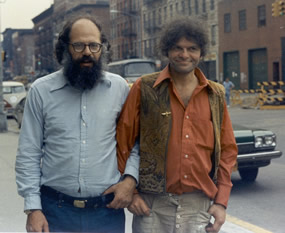
Hier met Allen Ginsberg (links)
De Amerikaanse dichter en schrijver Tennessee Williams (eigenlijk Thomas Lanier Williams) werd geboren in Columbus, Mississippi, op 26 maart 1911. Zie ook alle tags voor Tennessee Williams op dit blog.
Life Story
After you’ve been to bed together for the first time,
without the advantage or disadvantage of any prior acquaintance,
the other party very often says to you,
Tell me about yourself, I want to know all about you,
what’s your story? And you think maybe they really and truly do
sincerely want to know your life story, and so you light up
a cigarette and begin to tell it to them, the two of you
lying together in completely relaxed positions
like a pair of rag dolls a bored child dropped on a bed.
You tell them your story, or as much of your story
as time or a fair degree of prudence allows, and they say,
Oh, oh, oh, oh, oh,
each time a little more faintly, until the oh
is just an audible breath, and then of course
there’s some interruption. Slow room service comes up
with a bowl of melting ice cubes, or one of you rises to pee
and gaze at himself with the mild astonishment in the bathroom mirror.
And then, the first thing you know, before you’ve had time
to pick up where you left off with your enthralling life story,
they’re telling you their life story, exactly as they’d intended to all along,
and you’re saying, Oh, oh, oh, oh, oh,
each time a little more faintly, the vowel at last becoming
no more than an audible sigh,
as the elevator, halfway down the corridor and a turn to the left,
draws one last, long, deep breath of exhaustion
and stops breathing forever. Then?
Well, one of you falls asleep
and the other one does likewise with a lighted cigarette in his mouth,
and that’s how people burn to death in hotel rooms.
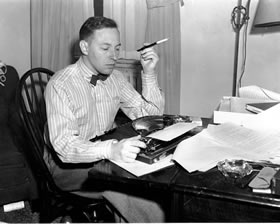
De Zuid-Koreaanse dichter en schrijver Hwang Sun-won werd geboren op 26 maart 1915 in Taedong, Zuid-Pyongan, in het hedendaagse Noord-Korea. Zie ook alle tags voor Hwang Sun-won op dit blog.
Uit: The Mule (Vertaald door Kim Chong-un and Bruce Fulton)
“When it gets real hot, that’s where they all start. Well, if he can’t afford a place to keep that mule, the least he could do is tie it up in his own yard. Why the hell does he have to keep it next to someone’s house? It’s a nuisance.”
“Well , why don’t we pay him a little visit this evening and tell him what Yu said?”
“Instead of going to his house, could you please tell him right here this evening when he comes to tie it up? See, it’ll be harder for him to turn you down than me.”
So saying, young Yu, as if he had just thought of something, produced from his pocket of Changsu tobacco he had bought for the old gentleman. “I just come across some of this–why don’t you try it?”
As always, the old gentleman waved off the gift with the hand holding the pipe─”Now why are you always…”─ but accepted it with the other hand.
“Grandpa, please tell him flat out to stop leaving his animal here. That mule owner feller won’t get the message if you beat around the bush.”
But the old gentleman, though he knew about the mule, couldn’t bring himself to confront the owner at the scene. Instead, he gave the man enough time to return home for dinner, then visited his house, located in a hilly area some distance off.
The mule owner was taking his meal in the breezy room beside the front gate.
“I’ve caught you in the middle of supper,” said the old gentleman, and he turned to go.
“No, no” said the mule owner ready to rush out and lead his visitor inside. “You couldn’t of come at a better time. We got a few odds and ends from the meal left over; how’s about having em with a drink?”
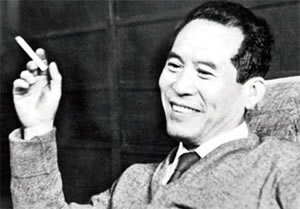
De Engels-Ierse schrijver en regisseur Martin McDonagh werd geboren op 26 maart 1970 in Camberwell, Londen. Zie ook alle tags voor Martin McDonagh op dit blog.
Uit: The Beauty Queen of Leenane
„MAG. What an odd dream that is!
MAUREEN. It’s not at all. Not at all is it an odd dream. (Pause) And if it is it’s not the only odd dream I do have. Do you want to be hearing another one?
MAG. I don’t.
MAUREEN. I have a dream sometimes there of you, dressed all nice and white, in your coffin there, and me all in black looking in on you, and a fella beside me there, comforting me, the smell of aftershave off him, his arm round me waist. And the fella asks me then if I’ll be going for a drink with him at his place after.
MAG. And what do you say?
MAUREEN. I say ‘Aye, what’s stopping me now?’
MAG. You don’t!
MAUREEN. I do!
MAG. At me funeral?
MAUREEN. At your bloody wake, sure! Is even sooner!
MAG. Well, that’s not a nice thing to be dreaming!
MAUREEN. I know it’s not, sure, and it isn’t a dream-dream at all. It’s more of a day dream. Y’know, something happy to be thinking of when I’m scraping the skitter out of them hens.
MAG. Not at all is that a nice dream. That’s a mean dream.
MAUREEN. I don’tknow if it is or it isn’t. (Pause. Maureen sits at the table with a pack of Kimberly biscuits) I suppose now you’ll never be dying. You’ll be hanging on forever, just to spite me.
MAG. I will be hanging on forever!
MAUREEN. I know well you will!“
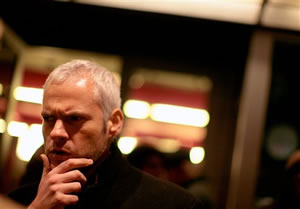
De Italiaanse, Duitstalige, dichteres en schrijfster Bettina Galvagni werd geboren op 26 maart 1976 in Neumarkt. Zie ook alle tags voor Bettina Galvagni op dit blog.
Uit: Melancholia
„In der Zeit nach dem Halbjahreszeugnis wurde ich krank und vom Fieber umspült, und so, zu Hause, schrieb ich wertlose Sachen, weil ich es schon zu dem Zeitpunkt nicht lassen konnte, vom immer denselben Dingen zu erzählen.
Es ist eine alptraumhafte Vision vom Pfleger mit den kakiroten Haaren, die dazu geführt hat, daß ich Schaum von abgestorbenen Wörtern vor dem Mund habe und eine existenzbedrohende Übelkeit im Kopf, die verstohlen aus den Augen schaut, wann immer ich sie öffne. Dabei hat man natürlich Rekreation für den Sommer gewünscht, das Übliche, was eigentlich immer gewünscht wird, ohne daß man sich eines großartigen Wortes von diesem geistigen Format hätte erfreuen können. Das wünschte man uns allen, und nachdem es einen Monat her war, daß der Wunsch mit dem übergeworfenen geistigen Schleier laut geworden war, habe ich das irgendwo vermerkt, es war schon der fünfzehnte Tag eines neuen Monats, dessen Ende früher immer der Anfang einer Reise war, dessen fünfzehnter Tag im letzten Jahr aber Ende war, und Ende einer Reise. Ma hat sich das gewünscht, und ich habe Schwäche geerntet, was ich schon auf der Zunge spürte, auf der das Wort sehr salzig und durchaus unangenehm schmeckte. Ich habe ein paar Früchte von den Bäumen geholt und mich damit auf den Boden gelegt, um nicht zu sterben, mit den glasigen Schalen auf meiner Wange, die ich dann an den Mund preßte wie Wasser, aber keinesfalls, um zu leben, es muß einfach ein Gift um mich herum gewesen sein, das ich mit der Fliegenklappe zu erschlagen suchte und das doch ausgelöffelt und geschluckt werden mußte, was ich von allen Anfang an wußte. Vielleicht waren diese von mir gegessenen Früchte aber einfach zu schwach, um einen schwachen Körper zu ernähren.“
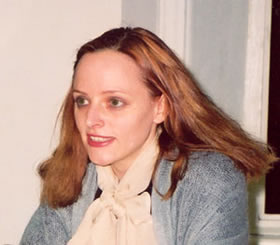
Bettina Galvagni (Neumarkt, 26 maart 1976)
De Chinese dichter Hai Zi (pseudoniem van de Chinese dichter Cha Haisheng) werd geboren op 26 maart 1964 in Huaining, een klein dorpje in de provincie Anhui. Zie ook alle tags voor Hai Zi op dit blog.
Folk Artists
Three blind men on the plain
are leaving for the far
Red handdrums suddenly beat
at midnight
There’s no dead man
no datewood crutch being buried
Beat, beat
The heart sleeps in the farthest place
Three blind men on the plain
are leaving for the far
That night
they eat sorghum pancakes in the dark
Vertaald door Ye Chun
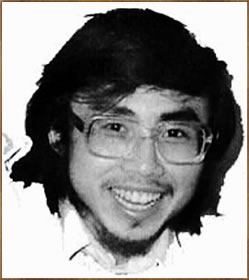
Hai Zi (26 maart 1964 – 26 maart 1989)
Zie voor nog meer schrijvers van de 26e maart ook mijn vorige blog van vandaag.
